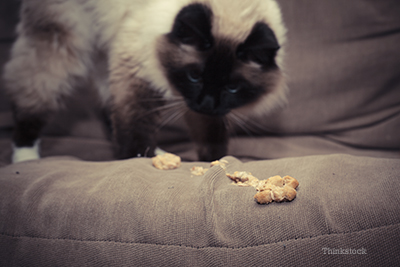Cats commonly develop hairballs that stress them and make us none too happy when we find them on the floor. Hairballs are, as their name implies, accumulations of hair that has been swallowed with grooming or excessive licking. Though generally considered a cat condition, other animals, including humans, can be affected. What are hairballs and how do they form?
What are hairballs and how do they form?
As cats groom themselves, they swallow a lot of the dead hair that has come loose. This indigestible hair passes down their throats and into the stomach. Most of this hair eventually passes through the cat’s digestive tract and then through the stools, but some of it remains in the stomach and gradually accumulates into a wet clump—the hairball.
What are the signs that my cat is having trouble with hairballs?
Because cats groom so much, it is not uncommon for cats to “cough up a hairball” as often as weekly. They are generally rather small (<1” in length) but can be quite large with long cylinders (up to 4” in length). On occasion they may lodge in the stomach or intestine and develop to a size that requires intervention.
Hairballs tend to begin with the sound of a cough that is followed by retching and gagging and then followed by expelling a cylindrical mass of hair. It is impossible to distinguish the cause of a cough just by the sound.
It is very difficult to differentiate the coughing and gagging associated with a hairball from coughing associated with primary lung disease or parasites.
Vomiting can also look a lot like coughing and may or may not be associated with a cough.
Is my cat likely to have problems with hairballs?
Long hair cats have a greater tendency to form hairballs, as do younger cats. Some cats that are prone to skin problems and excessive grooming may have more problems with hairball formation. In some cases, frequent vomiting of hairballs may indicate an underlying gastrointestinal problem, such as inflamatory bowel disease.
Prevention and management of hairballs
Brush and comb your cat frequently to remove hair that will otherwise be ingested. When you get a new kitten, start getting her accustomed to grooming. If your cat is a long hair cat and does not allow daily combing, it may be necessary to have her shaved regularly.
Administer a hairball remedy if necessary. Do not attempt to use mineral oil as there is a risk of aspiration. Petroleum jelly is effective if the cat will tolerate it. If not, there are a number of more palatable petroleum jelly based products that most cats find appealing.
Cat foods that have increased fiber content to facilitate the passing of hairballs and omega-6 fatty acids to enhance skin health may also be beneficial.
Questions to ask your veterinarian
- Why do cats regularly vomit wads of hair?
- How can I prevent hairballs in my cats?
If you have any questions or concerns, you should always visit or call your veterinarian -- they are your best resource to ensure the health and well-being of your pets.
